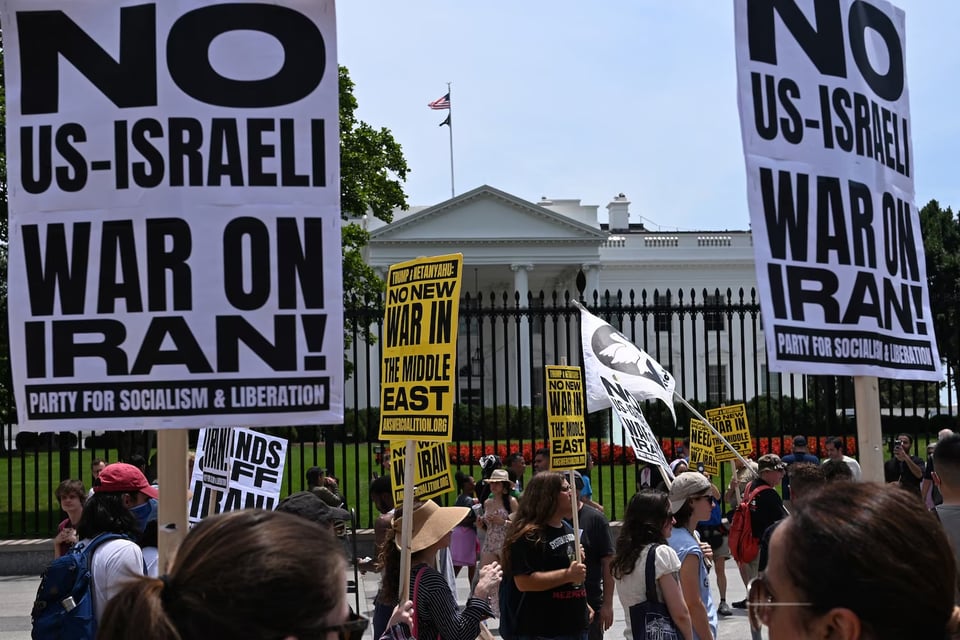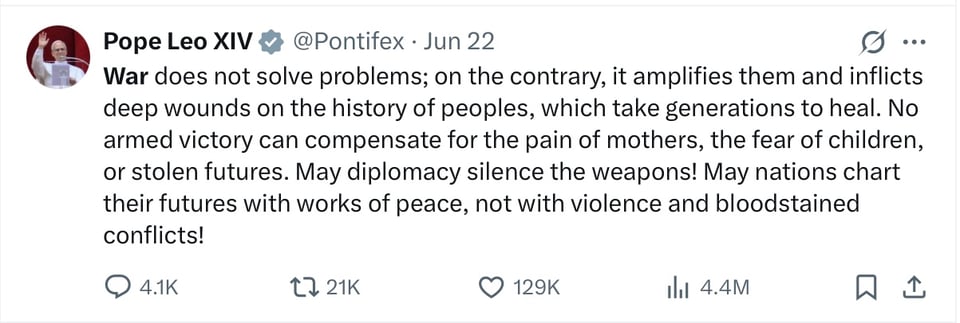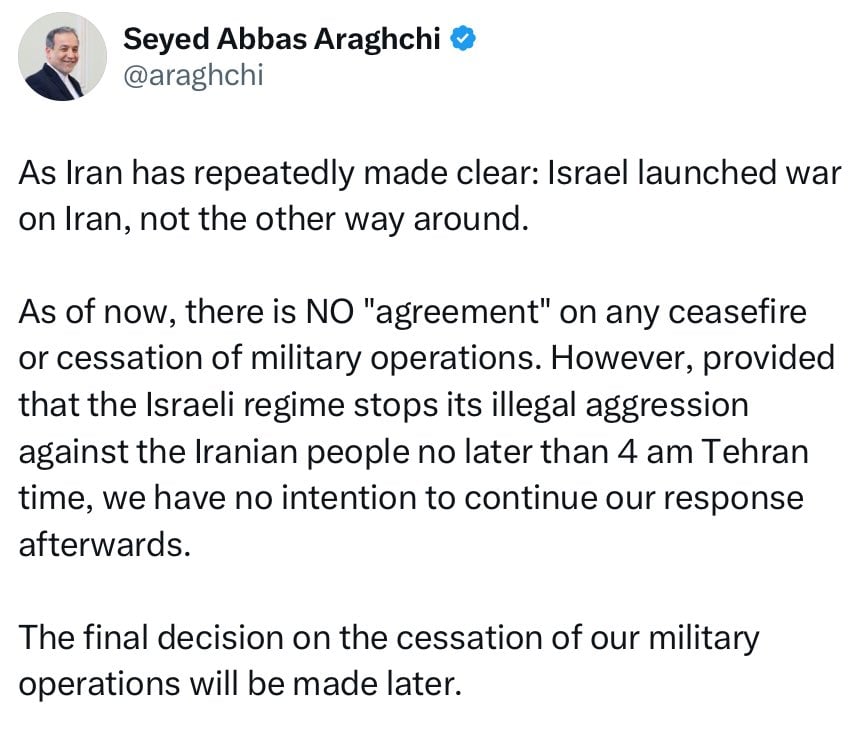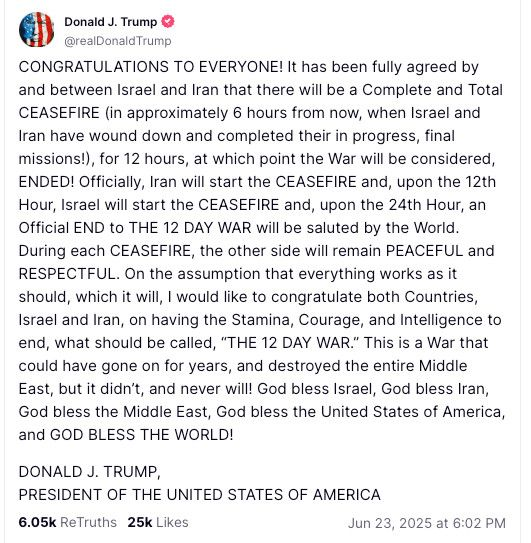Tuesday, June 24, 2025. Annette’s Roundup for Democracy.
Yesterday was the 53rd anniversary of Title IX, the law which not only changed women’s sports, but changed the role of women in every aspect of life.

In 1972, when Richard Nixon signed Title IX into law, would we have anticipated such landmark achievements for women’s sports, like the WNBA, founded in 1996, the women's professional basketball league in the United States with 13 teams (scheduled to expand to 15 in 2026), which fills arena after arena across the nation and frequently has higher television ratings than its male counterparts.
Who could have imagined many sports would have women stars known by their first names (“Caitlin, Serena, Venus, Coco, do you hear me?”) who would earn millions of dollars in sponsorship dollars!
Women’s sports drives an image of women as strong, strategic, competitive team players and leaders in the workplace as well as in the playing fields or on the courts.

America is at war.
What does Trump’s bombing of Iran’s Nuclear sites foretell? Does it matter that he did this without the Congress?
Trump faces bipartisan pushback to Iran strike as some question his war powers.
Some lawmakers argue Trump's strike against Iran was unconstitutional.
President Donald Trump's strike against Iran will be met with pushback on Capitol Hill this week as some lawmakers argue the military action was unconstitutional.
There are several bipartisan resolutions that could receive a vote in coming days that may put some lawmakers in uncomfortable positions as they consider whether Trump ignored the role of Congress in striking Tehran.
It's unlikely though, at this stage, that Trump's rank-and-file Republican base will broadly abandon him by supporting these bills. If any were to make it to Trump's desk, there likely wouldn't be enough votes to override his veto.
"I don't think this is an appropriate time for a war powers resolution, and I don't think it's necessary," House Speaker Mike Johnson told reporters Monday afternoon at the Capitol.
Fears of escalation ramped up on Monday as Iran retaliated against the U.S. with a missile attack on a U.S. military base in Qatar. The missiles were intercepted and there were no immediate reports of casualties at the base, according to U.S. officials.
Johnson said it's up to Trump whether the United States responds to Iran's attempt to retaliate on Monday.
"The president warned them not to retaliate, but he was also very clear that the threat of Iran obtaining nuclear capability is a threat not just to Israel and the Middle East, but to the United States as well. They've been very clear about their intentions and how much they hate us," Johnson said. "The president made an evaluation that the danger was imminent enough to take his authority as commander in chief."

People hold signs as they demonstrate in front of the White House in Washington, DC, on June 22, 2025 against US strikes on Iranian nuclear sites.
House Minority Leader Hakeem Jeffries expressed skepticism about Trump's decision to strike Iran's nuclear sites over the weekend.
"We've seen no evidence to date that an offensive strike of this nature was justified under the War Powers Act or the Constitution," Jeffries said at a news conference in the Capitol on Monday. "And what I can say is not a scintilla of evidence to date has been presented that I have seen to justify the notion that there was an imminent threat to the United States of America."
Trump's decision to hit Iran in the stated aim of wiping out its nuclear capabilities follows a decades-long pattern of presidents taking military action and not waiting for Congress to sign off. Other examples include Joe Biden's airstrikes in Syria in 2021, Barack Obama's military campaign against ISIS in Syria and Iraq as well as George H.W. Bush's invasion of Panama.
House and Senate lawmakers are expected to receive briefings on the Iran strike on Tuesday.
Trump faces bipartisan blowback

Rep. Thomas Massie leaves a House Republican caucus meeting at the U.S. Capitol on June 04, 2025 in Washington, DC. | Sen. Tim Kaine arrives for a hearing with Defense Secretary Pete Hegseth on the Pentagon budget and the crisis between Iran and Israel, at the Capitol in Washington, June 18, 2025.
Republican Rep. Thomas Massie and Democratic Rep. Ro Khanna introduced a War Powers Resolution last week to prohibit "United States Armed Forces from unauthorized hostilities in the Islamic Republic of Iran."
Democratic Sen. Tim Kaine is leading a similar Senate resolution, which could come up sometime this week as the chamber tries to move forward with a megabill to fund much of Trump's domestic policy agenda.
All three appeared on "Face the Nation" on CBS News on Sunday to make their case.
Massie contended there was "no imminent threat to the United States" that would authorize the president to strike Iran without congressional approval.
Kaine similarly said: "This is the U.S. jumping into a war of choice at Donald Trump's urging without any compelling national security interests for the United States to act in this way, particularly without a debate and vote in Congress. We should not be sending troops and risking troops' lives in an offensive war without a debate in Congress."
Kaine added that he hopes Republicans push back.
"I know many Republicans will fall in line and say a president can do whatever he wants. But I hope members of the Senate and the House will take their Article I responsibilities seriously," the Virginia Democrat said.
Khanna warned there is a possibility the strike is not a one-time occurrence.
"There are people who want regime change in Iran. And they are egging this president on to bomb. I hope cooler heads will prevail," Khanna said on CBS. "We need to pass Thomas Massie and my War Powers Resolution to make it clear that we're not going to get further entrenched into the Middle East."
Trump lashed out at Massie in a lengthy social media post on Sunday, writing the Republican congressman is "not MAGA" and that "MAGA doesn't want him" and "doesn't respect him." Trump said he'll campaign for Massie's Republican primary opponent in the next election.
Congress has twice before called out Trump on his use of military force without congressional approval.
In 2019, Congress approved a bill to end U.S. support for the war in Yemen, which Trump vetoed. In 2020, Trump ordered the drone strike that killed top Iranian general Qassem Soleimani. In response, Congress passed legislation seeking to limit a president's ability to wage war against Iran, which was again quickly rejected by Trump.
What is the 1973 War Powers Resolution?
The legislation introduced by Massie and Khanna seeking to limit Trump's ability to take U.S. military action against Iran cites the 1973 War Powers Resolution, which states that the president "in every possible instance shall consult with Congress before introducing United States Armed Forces into hostilities or into situation where imminent involvement in hostilities is clearly indicated by the circumstances."
It also states that in the absence of a declaration of war but when armed forces are introduced, the president must report to Congress within 48 hours the circumstances necessitating their introduction and must terminate the use of U.S. armed forces within 60 days unless Congress permits otherwise. If approval is not granted and the president deems it an emergency, then an additional 30 days are granted for ending operations.
Trump admin says strike was legally justified
Top officials defended the military action over the weekend. Defense Secretary Pete Hegseth said the administration "complied with the notification requirements" of the War Powers Resolution, saying members of Congress were notified "after the planes were safely out."
Vice President JD Vance and Secretary of State Marco Rubio also sought to emphasize the U.S. is not at war with Iran.
Trump, though, warned that more strikes could come if Iran doesn't negotiate a deal.
"If peace does not come quickly, we will go after those other targets with precision, speed and skill," he said in his address to the nation on Saturday night. (ABC News)
Conor Friedersdorf suggests the American people are victimized by Trump’s unilateral action because we who lose our right to weigh in to elected officials and affect policy.
The Danger of an Unrestrained President to the World

Acting on President Trump’s orders, the U.S. military conducted a strike early Sunday morning against three Iranian nuclear facilities. Few knew of the strikes in advance. Mr. Trump did not seek advance approval from Congress or the U.N. Security Council, as required by law. The unlawful strikes have thus laid bare the dangerous absence of any effective legal constraints — whether domestic or international — on the decision of the American president to use deadly force anywhere in the world.
It has become almost quaint to observe that the Constitution gives Congress, not the president, the power to declare war. Yes, the president is commander in chief of the military, but he is obligated to seek authorization from Congress before he initiates a war. The 1973 War Powers Resolution does not change this. Enacted in response to President Richard Nixon’s secret bombing campaign in Cambodia, that legislation is meant to prevent a president from launching illegal wars by legally requiring the president to seek approval of Congress before introducing U.S. armed forces “into hostilities or into situations where imminent involvement in hostilities is clearly indicated by the circumstances.” The only case in which the president is not required to seek the advance approval of Congress is when the United States has been attacked and he must act quickly to protect the country.
That was not true when it came to Iran. Quite the opposite. In a speech after the attacks, Mr. Trump pointed noted that Iran had been making threats against the United States for “40 years.” Nothing in what he or Secretary of Defense Pete Hegseth has subsequently said points to an urgent threat to America that prevented the president from seeking Congress’s consent before unleashing deadly force that could provoke retaliation against the United States and U.S. forces in the region. (And indeed, such a retaliation appears to have just taken place, as Iran fired missiles at a U.S. base in Qatar.) Nor can these strikes be shoehorned into the existing congressional authorizations for the use of force — one in 2001 against those responsible for the Sept. 11 attacks and another in 2002 against Iraq under Saddam Hussein. The president has thus claimed for himself power that the Constitution expressly gives to Congress.
Just as the president is legally bound to seek authorization from Congress before launching a war, so too is he required to seek authorization from the United Nations Security Council. In the wake of World War II, the United States designed and championed a global system where the use of coercive authority by any state against another was subject to collective checks. The United Nations Charter provides that signatory states must “refrain in their international relations from the threat or use of force against the territorial integrity or political independence of any state.”
This prohibition on the unilateral resort to force is the foundational principle of the postwar legal order. Only if the Security Council votes to authorize a war — or where a state is the subject of an “armed attack” — may a state that has ratified the U.N. Charter resort to force against another state. Yes, the requirement of gaining support from the Security Council is an obstacle, but it is an obstacle to Russia and China as much as it is to the United States. The requirement to seek and obtain Security Council authorization before using force, moreover, gives the United States extraordinary power: The United States holds one of five permanent seats on the Security Council and, with it, has a veto over any decision to authorize the use of force. While no legal system is perfect — and this one is no exception, as today’s global conflicts show — the U.N. Charter has nevertheless helped produce the most peaceful and prosperous era the world has ever seen.
Donald Trump has now fully embraced the so-called Bush doctrine, a foreign policy stance that holds that the United States can use force pre-emptively against a perceived threat — to itself or others. This was the key legal basis for the disastrous 2003 war in Iraq, held up as necessary to prevent the use of weapons of mass destruction — weapons that, it turned out, did not exist. Even then, President George W. Bush at least engaged with the Security Council and sought and won authorization from Congress before he launched that war.
Most presidents since have distanced themselves from the Bush doctrine. But presidents of both parties have relied on expansive interpretations of the right of self-defense under the U.N. Charter to use force in the Middle East against terrorist groups. They have relied, too, on expansive interpretations of Congress’s 2001 authorization for the use of military force after the Sept. 11 attacks. Mr. Trump has now taken a step far beyond even these stretched interpretations, launching a war that lacks any plausible domestic or international legal authority.
Some supporters of the president, such as Senator Lindsey Graham, seem unconcerned about the lawless strike, concluding that “the regime deserves it.” This is a dangerous argument, whatever one thinks of the merit of the strikes. And while Israel has the right to defend itself, that does not give it — or the United States — a blank check to attack Iran at will.
The lack of any effective legal constraints on the president is not just a problem for the balance of power and national security of the United States. It is now a problem for the world. The seeming rise of authoritarianism at home is precipitating a kind of international authoritarianism, in which the American president can unleash the most powerful military the world has ever known on a whim. In this case, failing to win the easy “deals” he had promised, Mr. Trump has now shown that he will abandon diplomacy and negotiation in favor of force. His actions may further embolden authoritarians around the world to do the same, setting an example of lawlessness that has the power to reshape the global legal order, transforming it from one governed by law to one governed by might.
Halting this transformation will require action — by other nations and by Congress. Countries must join together to denounce the United States’ unlawful action and to call for diplomacy, not force, to resolve the dispute between Iran and Israel. In the longer term, countries must find ways to work together in support of the law, perhaps even coming together as a formal group to adopt collective sanctions against the United States if it proves determined to violate it again.
Several members of Congress have condemned Mr. Trump’s unlawful decision to use force. That’s not enough. It is long past time to reform the way the United States makes decisions to go to war. As a start, Congress should immediately prohibit the use of federal funds for any use of force that exceeds the president’s legal authority. For too long, our lawmakers have acquiesced in the gradual draining away of their constitutional authority. They must act now to reclaim that power before it is gone for good and the world pays for our mistakes. (Oona A. Hathaway is a professor of law at Yale Law School, a nonresident fellow at the Carnegie Endowment for International Peace and the president-elect of the American Society of International Law., New York Times, Op-Ed).
Attacking Iran Without Congress’s Blessing Leaves Citizens With No Recourse.
Americans deserve a vote on the war.
By Conor Friedersdorf
Before Donald Trump ordered the bombing of nuclear sites in Iran, he was warned that, to quote Representative Thomas Massie of Kentucky, the Constitution does not permit the president “to unilaterally commit an act of war” against a nation that hasn’t first struck America. After the attack, Senator Chris Van Hollen of Maryland declared Trump’s actions “a clear violation of our Constitution—ignoring the requirement that only the Congress has the authority to declare war.” Representative Alexandria Ocasio-Cortez of New York stated, “It is absolutely and clearly grounds for impeachment.”
The judgment that neither the Constitution; nor the War Powers Resolution, a 1973 law meant to clarify and limit when the president can wage war; nor any bygone authorization to use military force, such as the one passed after 9/11, permitted the attack is one I share. But I don’t just lament the dearth of a congressional vote out of concern for constitutional law. I also fear that bypassing Congress weakens American democracy.
Recall the last time that the United States began a war this consequential: George W. Bush’s invasion of Iraq. Prior to invading, on October 10, 2002, Bush secured an authorization to use military force from Congress by wide margins in both chambers.
Even though the Iraq invasion was a mistake—something I have long believed—American democracy was better off for those votes, and not just because the Constitution assigns the war power to Congress. Debating the matter in the House and Senate helped educate lawmakers and the public about the arguments for and against the war, and left a record of who made claims that later proved incorrect. Prior to the vote, citizens could lobby their representatives, allowing for more participation in the process. And afterward, citizens could hold members of Congress accountable for their choices, not only in the next election but for the rest of the careers of everyone who cast a vote.
Government by the people demands opportunities to mete out such consequences. And as voters soured on Iraq, the ability to vote out members of Congress who approved the war provided a civic outlet for dissent. Just prior to the 2006 midterms, the Pew Research Center reported that “Iraq has become the central issue of the midterm elections. There is more dismay about how the U.S. military effort in Iraq is going than at any point since the war began more than three years ago. And the war is the dominant concern among the majority of voters who say they will be thinking about national issues, rather than local issues, when they cast their ballot for Congress this fall.” Pro–Iraq War senators including Rick Santorum of Pennsylvania and George Allen of Virginia lost races to anti–Iraq War challengers.
In 2008, Hillary Clinton likely would have defeated Barack Obama, who spoke out against the invasion as an Illinois state senator, in the Democratic presidential primary but for her Senate vote for the Iraq War. And John McCain’s vote for the war hung over him in that general election. Later, Senator Bernie Sanders’s star would rise in part because he could point back to the vote he cast against the war. All told, voters in hundreds of electoral contests spanning years, if not decades, cast ballots in part based on information gleaned from that 2002 vote.
Yesterday, in contrast, a lame-duck president who will never again be accountable at the ballot box went to war with Iran. There was no deliberation and no ability for voters to lobby their congressional representatives, and voters will be unable to credit or blame members of Congress for the outcome, or at least not as fully as if all were on the record voting yea or nay.
Despite the early majorities that supported the Iraq War, the war’s long-term effect on American politics includes growing popular aversion to wars of choice and foreign interventions. Even so, though Obama and Trump aligned themselves with popular opinion and campaigned on promises to avoid such engagements, they have now both unilaterally launched wars of choice, in Libya and Iran, respectively, once they were in office.
Their unilateral actions deprived Americans of representation and the ability to hold their representatives accountable after the fact. And the trend of denying the public democratic channels to oppose war isn’t merely anathema to a self-governing republic; it is dangerous. In the long run, removing official channels for citizens to effect change can be radicalizing.
Perhaps it won’t prove so in this case, if all goes well. But if a large cohort of Americans comes to regard the attack on Iran as a blunder, how will that popular anger be channeled? The ideal answer would be the next election. Trump has made that less possible. (The Atlantic).
One More thing.


Breakin’ News. Is the war between Israel and Iran over?
Here’s the latest.
President Trump said on social media on Monday that Israel and Iran had agreed to a cease-fire after more than a week of missile strikes on each other and a weekend attack on Iranian nuclear facilities by American bombers. There was no immediate confirmation of a deal by Israel or Iran.
Mr. Trump’s assertion came hours after Iran launched missiles at Al Udeid Air Base in Qatar, the largest American military installation in the Middle East, retaliating for U.S. strikes on Iranian nuclear sites though taking steps to limit the damage.
Vice President JD Vance said that the war appeared to be “effectively over” and that there was now an opportunity to “restart a real peace process.”
Mr. Trump’s language was characteristically less cautious.
“It has been fully agreed by and between Israel and Iran that there will be a Complete and Total CEASEFIRE,” the president wrote on social media. But he said it would not take place until the two countries had “wound down” military missions still in progress, which he said would unfold in phases over a day.
An Israeli military spokesman declined to comment, and there was no immediate comment from the Iranian government. But Israeli officials had suggested that the fighting might wind down soon. On Sunday night, the Israeli prime minister, Benjamin Netanyahu, said Israel was “very, very close” to achieving its aims in the war against Iran, although he did not provide a timetable for an end to the fighting.
Even as Iran prepared to target an American air base in Qatar earlier in the day, there were signs that the country was looking for an off-ramp from confrontation with the United States. Iranian officials and Mr. Trump said Iran had given advance notice that the missile strike was coming, minimizing potential casualties.
Mr. Trump said that 13 of the 14 Iranian missiles fired at Al Udeid had been downed, that no Americans there had been killed or wounded and that the damage was minimal. He also suggested that the fight, at least between the United States and Iran, might be over.
“They’ve gotten it all out of their ‘system,’ and there will, hopefully, be no further HATE,” he said, thanking Iran “for giving us early notice, which made it possible for no lives to be lost, and nobody to be injured.”
About 10,000 U.S. troops are stationed at Al Udeid, which serves as the regional headquarters for the U.S. Central Command. The Iranian strike on the base had initially stoked fears that the conflict with Iran might intensify, drawing the United States in deeper and expanding across the region. Qatar condemned the attack on its territory and said it reserved “the right to respond directly.”
Iranian officials had said their country needed to be seen striking back at the United States for its attack on critical nuclear installations, but cautiously. Iran used a similar approach in 2020, giving a heads-up before firing ballistic missiles at an American base in Iraq in reprisal for the assassination of its top general.
The Iranian assault came as Israel launched wide-ranging strikes on Tehran on Monday and promised more “in the coming days,” pressing on with its bombing campaign two days after the United States attacked three Iranian nuclear sites.
But the new Israeli barrage, which a military spokesman said targeted a paramilitary headquarters and access routes to the Fordo nuclear enrichment site that the U.S. military bombarded, came as Iran fired salvos of missiles that sent Israelis to huddle in shelters, and as Iran’s foreign minister, Abbas Araghchi, met with a key ally, President Vladimir V. Putin of Russia.
While the Russian leader called the U.S. strikes “absolutely unprovoked aggression,” he stopped short of offering concrete support for Iran. (New York Times)
That was one report.
But as Rep. Jason Crow said about Trump’s report of an Israel-Iran ceasefire announced by Pres. Trump. "We don't know what's fact from fiction at this point.”
Iran's Foreign Minister, Seyed Abbas Araghch directly refuted Trump's claim of 'ceasefire.’



Trump is always crazy.
Is this all being done as a ploy by a delusional man to set himself up to win a Nobel Prize?
By tonight we should know.